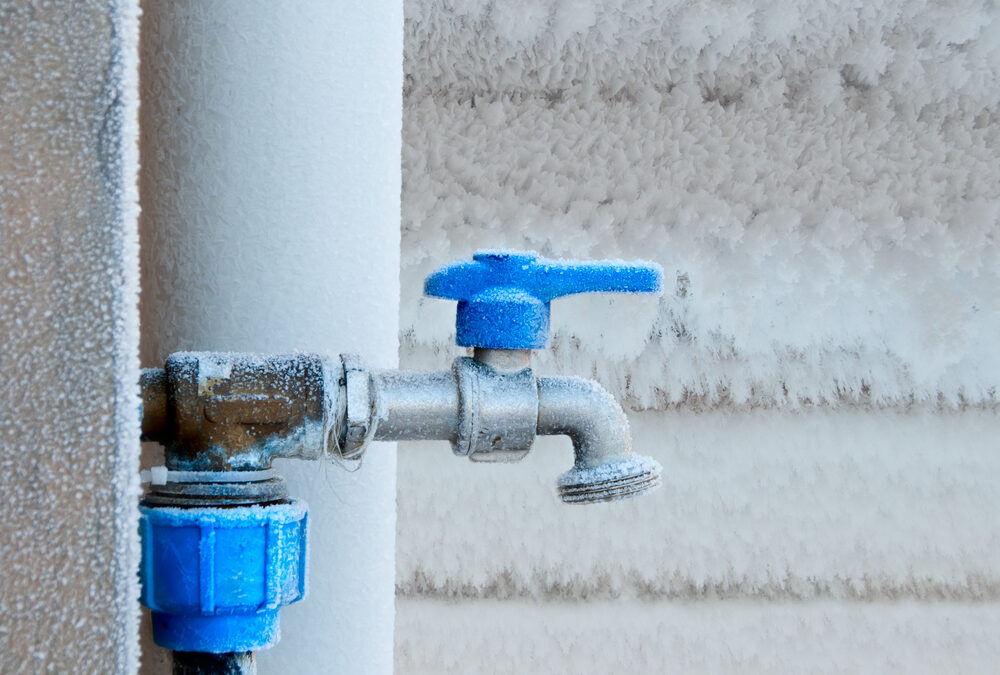Prevent damage from freezing by winterizing your Show Low, Pinetop, Lakeside, or White Mountain home’s pipes and plumbing.
Water pipes and plumbing can freeze and crack in the cold mountains winters. You can prevent freeze damage by taking some precautions.
Water expands approximately 10% when it freezes to become ice. Pressure increases inside the pipes during a freeze. which causes damage, both to the pipes and possibly even serious damage to your home. Winterizing your home’s plumbing can prevent freeze damage and is recommended especially if a house will be vacant for a long period of time and no water will be running through the pipes and no heat in the home.
Winterizing process involves emptying the water heater, draining all water from the pipes, and filling your home’s fixtures with an antifreeze solution.
Preparing for Winterization
Develop a checklist for winterizing your plumbing. Missing a step could cause expensive damage. Include all plumbing parts, including faucets and valves, when making your list. Check off the steps as you move forward so you know you completed the task to avoid damage from a frozen pipe that breaks.
Winterizing Your Plumbing
Follow these steps to winterize your home’s plumbing:
- Shut off the valve at the main water source to your home, and then turn off any water circulator or pressure tank pumps as well as the water heater.This protects your water heater “heating element” from dame when there is no water in the tank.
- Open and drain all other water faucets in the home. Check off each on your list, so you are sure all faucets are open. Missing a faucet could leave water trapped inside the pipes. All faucets and water valves should remain open throughout the winter.
- Use compressed air to blow excess water out of the pipes.
- Open the drain valve at your water heater tank and let it drain until it is empty. Caution, sometimes, in fact often, hot water tanks don’t have floor drains and you will need to connect a garden hose to it.
- Drain all the water from any pressure holding tanks. Add antifreeze to the water pressure pump is one is present.
- Flush your toilets to remove as much water as you can from the tanks and the toilet bowls. If remains, add antifreeze to prevent the freezing water from cracking the toilet.
- Check all sink and tub drains that most likely have “drain traps” and add some antifreeze to prevent water from freezing and cracking in the drain traps.
Preventing Frozen Pipes
Be sure to check your home’s plumbing by locating all pipes that are likely to freeze. Check pipes located in exterior walls, near windows, pipes that are not insulated, and plumbing in or near unheated spaces like crawl spaces, attics, and garages.
It is important to check for any cracks or openings in walls, floors, and ceilings. If you find cracks or holes during be sure to caulk or repair them to prevent cold air from entering.
Some pointers to follow:
-
Insulate pipes. Do not leave gaps in the insulation for cold air to penetrate. PEX piping is more tolerant of freezing than old copper or steel water pipes, but the same precautions should be followed. Copper and PVC is very vulnerable to cracking.
-
Inspect the exterior of the property, making sure that all visible cracks are sealed.
-
When possible, maintain a heating source inside the building to protect pipes against cold.
-
It is a good idea to maintain a faucet dripping, allowing the water to move freely and continuously, reducing the potential for freezing.
-
Make sure the crawl space is properly insulated. Block all vents that lead to the outside using cardboard or wood.
-
Remember your homes exterior hose bibs. Hose bibs are often forgotten and can easily burst in the middle of the night if not protected. Drain hose bibs and insulate with covers.
-
Once all the above steps have been completed, deactivate faucets and hose bibs at the main shutoff valve.
-
If needed, use heat tape to protect pipes from freezing. Heat tape is often used for winterizing pipes, but caution should be used as there are also potential fire dangers if not used correctly.
-
And of course, you can call us at Bianco Plumbing LLC to provide you these and any other professional plumbing services to have peace of mind and prevent freeze damage to your home’s plumbing.

